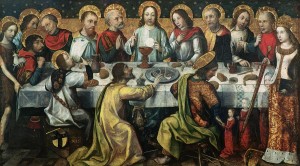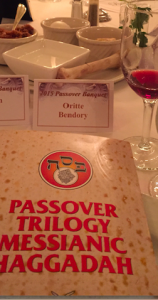When a Good Jewish Girl celebrates Eastover
Of all the Jewish holidays, Passover, steeped in tradition, song, and food, has always been the most fun. Our regular kitchen was closed for the week, and we had a special ‘Kosher for Passover’ kitchen in our basement where we would convene around a long table with extended family and friends, surrounded by seventies furniture that hadn’t survived the upstairs renovation – a sectional leather couch, a massive television set, and a treadmill. I was allowed to drink wine and my sisters and I would sing the songs by heart while our cousins performed a who-could-eat-more-horseradish-before-burning-your-face-off competition.
We would go around the table and read a Hebrew passage from the Haggadah in the order in which we sat. Except when we arrived at the section about the four sons: the wise one, the wicked one, the simple, and the one who does not know how to ask. Even though it wasn’t my turn, my mother would slap her hand down on the table and call out my name to read: “Oritte! The wicked one!”
It probably should have upset me to be called the wicked one (the bitch?) but instead it filled me with some perverse pride. Yes, I was the middle child, tomboyish and stubborn, but mostly, to me it set me apart. It meant that I was unique in my mother’s eyes. Besides, I was too young to be wise, too much of an over-thinker to be simple, and too curious to not ask a million questions, so perhaps I was just wicked by default.
And so I would read aloud in Hebrew: “What does the wicked son say? What does this drudgery mean to you? To you and not to him. Since he excludes himself from the community, he has denied a basic principle of Judaism.”
I never thought about the meaning of that passage and its applicability for me until this year, when I celebrated Passover with my family on Friday night at my sister’s home, led by her husband who is a Rabbi, and then celebrated Easter at Church with my Christian husband on Sunday. I’d attended Easter services with him before, and Christmas too.
When I happened to speak to my mother on the phone Sunday morning, she asked me, “What are you doing today?”
Three years ago, when my goyfriend and I were just becoming serious and my mother had asked that question on Easter morning, I didn’t tell her the truth. Why upset her unnecessarily? Why cause conflict or try to explain my position, when I couldn’t explain it to myself? I didn’t really understand the meaning of Easter; I was going to support my husband and honor his faith, just like he honored mine.
This time, I answered her without hesitation: “It’s Easter,” I said. “We are probably going to Church.”
“What?” she said, not hearing me.
And then I said it again, this time removing the apologetic word “probably” intended to spare her (but really, me) of discomfort. “It’s Easter,” I repeated. “We are going to Church.”
A brief almost imperceptible pause followed by, “Okay, have a good day.”
Progress is an interesting thing and reveals itself in unexpected moments such as this one. It made me think of how, back when I announced to my mother that my goyfriend and I were discussing a future together, that our relationship was healthy and we communicated about everything, she said: “If you talk about everything, have you talked about him converting?
We’ve come a long way in a short time. My parents have embraced my choices and love my husband, but mostly, they love me and want me to be happy. And slowly, I am learning about and embracing the meaning of Christianity, my husband’s faith. If I really want to understand what makes my husband tick; how he thinks, sees the world, and how he loves (including how he loves me), I need to understand the root of Christianity. If I really want to know my husband, I better get to know this guy named Jesus. And it helps that Jesus was a Jew. The night he was crucified, he was hanging out at a feast surrounded by other Jews and eating matzah, just like we were doing in my family’s basement. 
But in doing so, by learning about Jesus and the Christian meaning of Passover, by getting more comfortable with it all, was I cementing my persona as the wicked child? Was I excluding myself from the community by doing so, by denying a basic principle of Judaism?
Except it didn’t feel wicked – it felt good. And three nights later, my husband invited me to a Passover banquet organized by some Christians he knew from Church. My heart leapt with excitement and identification. A Christian Seder, hosted by a woman with a Hebrew name, hosted by my people! It sounded welcoming, a place where both my husband and I could honor each of our own faiths, but at the same time – together. I was fascinated.
The banquet took place at the Yale Club, in a large ballroom that must have held countless Jewish weddings, I thought to myself, as my husband and I sat down at our table. It was adorned with the familiar Seder plate and goblets for wine (which to my dismay were later used for Manishevitz grape juice). An older grey haired man – a Rabbi – got up on the podium. He was dressed in a kitel, a white robe worn by traditional Jews during sacred events, like my Rabbi brother in-law wore when he married my sister, and on the Jewish high holy day of Yom Kippur. He resembled most of the Orthodox Jewish men I grew up with.
“I am a Jew raised modern orthodox,” the Rabbi said as he welcomed us. “And I believe that Jesus was the Messiah.”
The Rabbi was a Messianic Jew, I realized with a start. I was at a Messianic Seder.  In my ignorance and superficial recollection, Messianic Jews were bohemian types, “Jews for Jesus” holding signs in public squares. But this, the warmth in the room, the welcoming smiles, the young professionals sitting across from me and the elderly couples at the other tables were nothing of the sort. The blessings and chants were identical to those I sang at home.
In my ignorance and superficial recollection, Messianic Jews were bohemian types, “Jews for Jesus” holding signs in public squares. But this, the warmth in the room, the welcoming smiles, the young professionals sitting across from me and the elderly couples at the other tables were nothing of the sort. The blessings and chants were identical to those I sang at home.
When we arrived at the “time to eat” section of the Seder, I began talking to two women sitting beside me, both Christians in their thirties, one of whom worked in advertising like I did. She asked me how my husband and I met.
“I was on my way to Brooklyn for a Hannukah party…to meet Jewish guys,” I said. “But I had to make a pit stop at a bar for a friend’s work party, where he happened to be. I never made it to the Hannuka party,” I smiled. Come to think of it, seems like whenever I am Jewish holiday bound, God offers up an alternate route.
“You’re Jewish?” she asked. “That’s so great. It’s so great that you’re open.”
“Open? What do you mean?” I asked.
“That you’re here,” she said.
I laughed, pleasantly surprised. Being here – partaking in a Christian themed ritual had become so natural for me that it didn’t even occur to me that it might be unusual. It wasn’t something I was making an effort to do. I wasn’t trying to be open. It had become something I just did. That I wanted to do.
We began talking about dating in NYC (an endlessly amusing and frustrating topic, as I’ve blogged about ad nauseam). They were both single, hoping to meet a Christian. Another woman at our table spoke of a recent break up to a Jewish man whom she almost married.
“We were together for two years…we were so in love,” she said. She had started the process of studying with a Rabbi, considering conversion. But in the end, they couldn’t surmount their differences. More specifically, she said his parents could not.
This filled me sadness, and I looked at my husband, our eyes meeting in a shared moment of gratitude that he and I had been blessed enough to allow our faiths and shared belief in God to unite us, rather than divide us. That we had found a way to integrate our faiths, converging on this very holiday of Passover, be it the Jewish version or the Christian one. And that our families, rather than inserting a stumbling block in our path, had found a way to embrace it too.
The Seder concluded with the traditional chant, “Next year in Jerusalem!” which commemorates our exodus from slavery and into freedom, into the land of Israel.
I thought about the freedom that I had been afforded, to commemorate the rituals of my religion freely, and my husband’s too.
And I recalled how last year at this time, my husband and I were actually in Jerusalem, touring the Old City’s Jewish and Christian quarters. Celebrating Passover in the Holy Land – both mine and his.

I’m all about Jews for Jesus 🙂 But no water into wine? Heaven’s no…
Haha. Water into wine will be next year’s post 😉
One of my favorite posts you’ve written. Beautiful flow to your writing and great illustration of people learning about each other and loving through the supposed barriers. Shame about the woman you were sitting with–it’s so hard to find a match…. what a sad thing for people not to be able to surmount their differences. You and Daynan have turned that into an enriching journey.
Thank you, Kelly!
I love how the same struggles of biblical times, the same views and attitudes, remain today. I’m glad you are both listening and hearing, rather than resisting.
Well said, thank you!
Great post, Oritte. This part at the end got me: “the freedom that I had been afforded, to commemorate the rituals of my religion freely, and my husband’s too.” Too many places where this isn’t possible, too many people still persecuted for their religion, or for interfaith relationships.
So true. Thank you, Laura.
Great post Oritte – love the imagery.